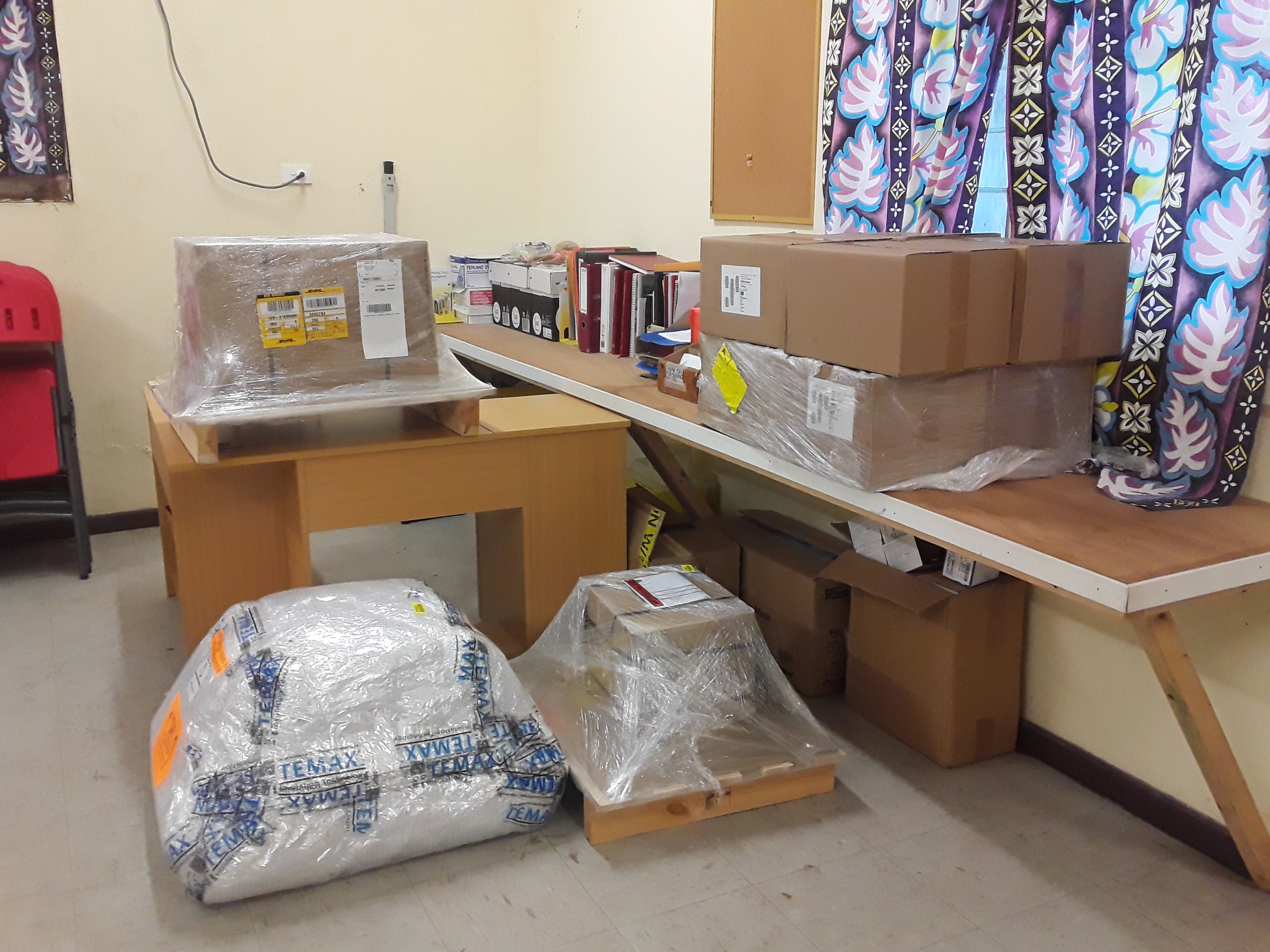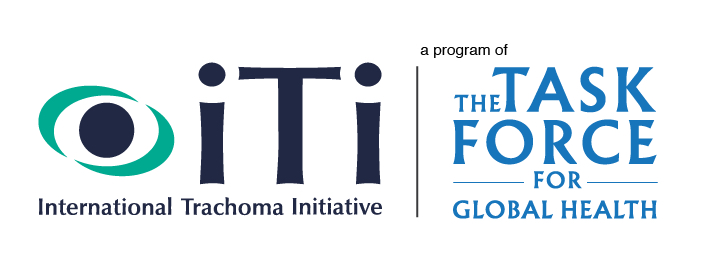Poo Einabarara Poo: A Legend Brings Hope to Trachoma Elimination in Nauru
Written by Sue-Chen Apadinuwe, Sumon Ray, Sara Webster
First Zithromax® Shipment to Nauru
In the midst of the COVID-19 pandemic, a total of 14,448 treatments traveled 12,451 miles to Nauru, the third smallest nation in the world. From Brussels to Singapore to Brisbane, Nauru’s first-ever Zithromax® shipment arrived safely in the storeroom at the Public Health Eye Mini Dispensary in Denig, Nauru on March 27, 2020. The arrival of the shipment marked a milestone in Nauru’s journey to end trachoma.

Nauru’s first-ever Zithromax® shipment arrived safely in the storeroom at the Public Health Eye Mini Dispensary in Denig, Nauru on March 27, 2020. Photo credit: Ministry of Health, Nauru.
Poo Einabarara Poo
For generations, way before the arrival of the Zithromax® shipment, Nauru had another tool that would be crucial in eliminating trachoma: the ancient tradition of storytelling. One such story – the legend of Eigigu – brought much attention to the topic of trachoma.
The legend is about a woman named Eigigu who tended to her small Eidigamadere tree (an extinct tree native to Nauru) as part of her daily routine. The tree eventually grew tall and strong and tempted Eigigu to climb all the way up the tree which landed her on the moon. Tired and thirsty from her climb, she searched for something to drink until she came upon the house of an elderly woman, Einabarara. Einabarara was making toddy – a sweet coconut syrup – and poured it into coconut shells to drink. Eigigu shortly realized that Einabarara was blind and took advantage of that to take a drink of the toddy. Eventually, as Einabarara was taking inventory of the toddy, she caught Eigigu by the hand as Eigigu was trying to get another drink. Einabarara proceeded to tickle Eigigu as punishment, but Eigigu pleaded to Einabarara by offering to help with chores. That didn’t work, so Eigigu finally said, “Please stop and I will fix your eyes.” Einabarara was pleased with this offer and so she agreed. Eigigu approached Einabarara’s eyes and blew into them saying, “Poo Einabarara Poo.” Einabarara was slowly able to see with every breath blown by Eigigu. Insects, dirt, and other irritants fell from her eyes. Now that Einabarara could see again, she noticed the beauty of Eigigu and offered one of her sons, the Moon, to be her husband. To this day, the people of Nauru have witnessed Eigigu smiling and pounding pandanus leaves every time they look at the moon.
Sue-Chen Apadinuwe, the Nauru Trachoma Coordinator, elaborates on the legend, “What Eigigu did in climbing to the moon, it was simple and while some think it is impossible, it is not. Trachoma elimination is the same – it is not impossible. You take the medicine and wash your eyes to stop the insects, dirt, and trachoma from getting in and eventually making you blind like Einabarara.”
The legend of Eigigu gave birth to the slogan of ‘Poo Einabarra Poo – Trachoma is Easy to Prevent’. Poo Einabarra Poo represents Eigigu blowing on Einabarara’s eyes. The Nauru trachoma team used the slogan in drama skits and other communication methods including radio to talk about trachoma. Every person in Nauru began to understand that they also have a role in ending trachoma.
Nauru Trachoma Team with a "Poo Einabarara Poo: Trachoma is easy to prevent" poster. Photo credit: Ministry of Health, Nauru.
Trachoma MDA in a Pandemic
Although sharing the legend was instrumental in spreading the message about trachoma, the Nauru trachoma team had to dedicate some of their time to COVID-19 efforts. The original mass drug administration (MDA) was supposed to begin as COVID-19 hit the region and Nauru immediately took action. Fortunately, no cases of COVID-19 have been reported in Nauru. The island took many measures to prevent the virus from entering Nauru such as implementing restrictions for international flights and establishing quarantine facilities for people who were allowed entry into the country. Consequently, the MDA was postponed and public health personnel were required to assist with prevention initiatives, which included staffing quarantine facilities and conducting health checks at the airport.
When the MDA did commence in May 2020, the number of teams going out was reduced to account for public health staff still working on prevention initiatives for COVID-19. The trachoma team was also conscious of not delivering mixed messaging regarding trachoma and COVID-19, and to ensure that the community were aware that the Zithromax® being distributed is used to treat trachoma and not COVID-19. Despite the challenges and interruptions in starting the MDA, the team found that while educating community members about trachoma, it was a good opportunity to also answer questions and provide information about COVID-19.
Nauru’s First Nationwide MDA
With a population of approximately 11,000 people, the Nauru MDA took place across all 14 districts, with the aim of reaching a high coverage rate. Spreading information about the MDA by word of mouth really helped reach out to the community. The team was resourceful and conducted MDA training via a video link.
MDAs started in May 2020 and were finished by June 2020. Although there were many worries about the consequences of an online MDA training for a first-time trachoma MDA, those worries were eased after having a follow-up call with the trainers, which revealed minimal issues.
Zithromax® is donated for the elimination of trachoma – ocular chlamydia infection - although anecdotally, sexually transmitted genital chlamydia is also a problem in Nauru. Because the population of the island is too small for anonymity, there is a reluctance for people to present at the clinic for sexually transmitted infections, particularly unmarried youths. The unlooked for effect of Zithromax® on STIs was observed and Sue-Chen recalls a group of teenage boys being excited about the dual positive impact of MDA because everyone will be treated without having to go to the clinic.
Sue-Chen continues, “It has been fun, we have been able to talk to adults and engage with the community. Being small, means word of mouth has been effective. People are responding and presenting at clinics to get it if we missed them at their house.”
Power of Partnerships
The MDAs were made possible through a partnership with the Nauruan Ministry of Health and Medical Services through the Department of Public Health, The Fred Hollows Foundation, The WHO Department of Technical Support in Fiji, and the International Trachoma Initiative.
The Nauruan Ministry of Health and Medical Services managed MDA trainings and implementation. Funding was provided by The Fred Hollows Foundation supported by the United Kingdom’s Department for International Development Commonwealth Fund (primary grant held by Sightsavers International). The WHO Department of Technical Support in Fiji also provided financial support. Zithromax® was provided by Pfizer through the International Trachoma Initiative.
A Future Free From Trachoma and Other Eye Diseases
Sue-Chen adds, “We have always had eye infection issues, such as conjunctivitis. It comes and goes, comes and goes. Eye health issues are only ever treated at the time they are an issue. An individual will come in but the rest of the family may not be treated because we don’t have enough medicine. Because of the MDA, we can cover everyone. If we keep on washing our face and hands, we will then eradicate it. We won’t go around re-infecting each other. We will be really pleased that all us will now be treated and we all know about trachoma now.”
For generations to come, along with the legend of Eigigu, the people of Nauru will also tell the story of how their ancestors worked to eliminate trachoma in the middle of a pandemic with ‘Poo Einabarara Poo’ engrained in their hearts and minds.

